Das Olympische Bildungsmagazin
Once upon a time: John McCain und das IOC
- Jens Weinreich
- 3. November 2008
- 20:37
- 9 Kommentare
McCain? Da war doch mal was … Ja, Senator John McCain (R-AZ) war einst ein ganz garstiger Beobachter des olympischen Treibens. Er hat dem IOC sogar mal mit dem Entzug der Steuerbefreiung für die US-Geschäfte und dem Entzug der Sponsoren-Milliarden aus den USA gedroht (was u.a. die NBC-TV-Verträge betroffen hätte). Im April 1999, als es für Politiker opportun war, das von Korruptionsenthüllungen erschütterte IOC zu ärgern, veranstaltete McCains Senatsausschuss (Senate Committee on Commerce, Science and Transportation) in Washington ein erstes Hearing zum IOC-Bestechungsskandal. IOC-Präsident Juan Antonio Samaranch aber mochte nicht dabei sein (er erschien erst bei einer zweiten Anhörung im Dezember, als das Schlimmste überstanden war). McCain wetterte:
I am deeply saddened that Mr. Samaranch has declined our offer to testify before the Commerce Committee. It would have been extremely informative for the Committee, in seeking to understand the IOC’s reform efforts, to hear from Mr. Samaranch who placed himself in charge of the reform and ethics initiatives of the organization. Apparently, Mr. Samaranch doesn’t understand the gravity of the situation for the future of the Olympic movement. The lack of transparency and accountability within the IOC, that fostered a culture based on gifts and lavish travel, has brought a dark cloud over the integrity of the Olympics. We must now move forward, unfortunately without Mr. Samaranch’s direct input, to ensure that urgently needed reforms are implemented.
Es wurde dennoch eine lustige Veranstaltung. Dafür sorgten IOC-Vizepräsidentin Anita DeFrantz mit ihrer Ahnungslosigkeit – und natürlich Andrew Jennings, seit seinem 1992 erschienenen Buch „The Lords of the Rings“ der gefährlichste Feind, den das IOC je hatte. Jennings wurde ebenfalls vorgeladen und durfte nun ungestraft all das ausplaudern, wofür er einige Jahre zuvor vor einem dubiosen Polizeigericht in Lausanne, am Sitz des IOC, noch zu einer absurden Gefängnisstrafe verurteilt worden war. Mit anderen Worten: Jennings durfte die Wahrheit laut verkünden.
Unmittelbar nach dem Hearing erklärte McCain:
Bill Extends Foreign Corrupt Practices Act to IOC
WASHINGTON, D.C. – Senator John McCain (R-AZ), Chairman of the Committee on Commerce, Science, and Transportation, today introduced a bill expanding the Foreign Corrupt Practices Act to include the International Olympic Committee. Following is his statement:
Today I introduce legislation that would make the International Olympic Committee subject to the Foreign Corrupt Practices Act. This legislation is in response to what I believe is a failure on the part of the International Olympic Committee (1OC) to adequately respond to corruption in the selection of cities to host the Olympic games.
This morning, I chaired a hearing of the Commerce Committee on the recent public controversies involving the Olympic bid process. As most you know, allegations of bribes and corruption in the Salt Lake City bid process have prompted investigations by the Utah Attorney General and the Department of Justice. The Committee examined the bid process as a whole and the reform efforts undertaken by the United States Olympic Committee (USOC) and IOC respectively.
The Committee heard testimony from the USOC, IOC and the Special Bid Oversight Commission. The Commission was appointed by the USOC to review the circumstances surrounding the selection of Salt Lake City to host the 2002 Winter Olympics. The Commission, composed of a group of highly respected individuals including our former colleague Senator George Mitchell and Ken Duberstein, made a series of recommendations to reform both the USOC and the IOC. The recommendations focused on bringing transparency and accountability to both organizations.
The USOC appears to be moving forward with reform. It adopted in full the recommendations of the Commission and took responsibility for its own failure to oversee the Salt Lake City bid process. While not complete, I believe the process of reform at the USOC is underway. Unfortunately, the hearing did very little to ease my concerns about the 1OC. IOC representatives expressed opposition to several of the Commission’s recommendations and continues to be resistant to change. While I understand the IOC may have legitimate concerns about some of the suggested reforms, I question their commitment to reform.
This morning Senator Mitchell and the other members of the Commission agreed that Congress should take action to ensure that the IOC is subject to the Foreign Corrupt Practices Act. In the United States, the Foreign Corrupt Practices Act is available to law enforcement to combat official corruption in international business transactions. Currently, IOC members are not governed by the law because they do not generally act in the role of a foreign official. Rather, they act on behalf of the IOC, a private enterprise. My amendment would bring the IOC under the definition of a Public International Organization subjecting them to the Foreign Corrupt Practices Act.
This bill is the first concrete step toward comprehensive reform. This morning, Senator Mitchell’s Commission offered to provide the Committee with further comments on possible legislative solutions to this problem. I look forward to hearing their ideas and working with them. I know that many of my colleagues will introduce other measures and I look forward to working with them as well.
Seine Erinnerungen an John McCain, Anita DeFrantz und jenen legendären 14. April 1999 in Washington hat Andrew Jennings im Buch „The Great Olympic Swindle“ zusammen gefasst. Hier ist das Kapitel im Original, mit ausdrücklicher Genehmigung des Autors, der immer noch sein Unwesen treibt.
Anita’s Bad Hair Day
von Andrew Jennings
When Anita DeFrantz strode through the government halls that bright, gusty Spring day in 1999, it was obvious to anyone watching that she was special. You could see it in her powerful physique. She looked taller than her five foot eleven inches, broad shouldered and vigorous, younger than her forty-seven years.
You only had to look at the way people gathered around her, smiling and eager, as she made her entrance into the spacious hearing room, just across the street from the Capitol. Resplendent in peacock blue, she turned her large, handsome head and beamed back at them, took a hand here, a hand there, meeting and greeting like a member of royalty.
Anita belongs to that most regal of families, the Olympic family. On the world body that governs the Games, the International Olympic Committee, she is one of few women and the only black American. Anita is a royal with a difference. The daughter of a civil rights leader, she says she takes inspiration from the life of Harriet Tubman, an escaped slave who led three hundred more to freedom.
Anita DeFrantz would need inspiration in Washington that day. The Olympic family was in peril and she’d been sent to defend it. Members of the IOC, handpicked by their leader, Juan Antonio Samaranch, to select the cities that host the Olympic Games, had been caught behaving badly. They chose Salt Lake City, Utah, for the winter of 2002, and, it turned out, some of them had traded their votes for jobs and scholarships for their children, sometimes scholarships for other peoples children or kids who did not exist at all. Some members dispensed with the scholarship malarkey and settled for plain old cash.
In Utah Olympic people took free ski holidays and sleigh rides and shopping trips and massage. Yes, massage. Back home they greeted delivery men who strained under the weight of free bicycles and boxing rings and freezer units and all sorts of things that had nothing legal to do with deciding which city might put on the best Winter Games.
There was no problem until people outside the Olympic family found out and that wrecked Christmas 1998. The world’s press united in disgust at the notion that bribery should taint the near-sacred Olympics, and the family set about defending what credibility it had left.
When scandal broke, the family’s American branch, the United States Olympic Committee, had the Salt Lake bidding team investigated by tough-minded outsiders, owned up to mistakes and pledged to change.
Across the globe in Switzerland, in his splendid Lausanne compound, President Samaranch took a different tack. He called up a world-class group of spin-doctors. He personally selected five trusty IOC members to investigate their peers. The five made some inquiries and reported back.
There was bad behaviour, they said, and the hosts were the culprits. Those people were so insistent, and persistent, and, well, so darned friendly down in Utah, some vulnerable members thought those lovely gifts were about personal friendship, nothing to do with the business of getting the Games. A few Olympic heads rolled.
That wasn’t good enough for most people. In Washington DC, Senator John McCain felt agitated. As chairman of the Senate’s commerce committee, which supervises Olympic affairs, he knew that more than half of the IOC’s budget comes from US tax breaks, American television companies and sponsors. He knew that many thousands of ordinary sports fans could be relied upon to send cheques and cash to support their Olympic team. He didn’t like to see his country being taken for a ride. McCain invited Samaranch to come and talk to the committee – in April, a gorgeous time of year in Washington, when cherry trees begin to flower.
Perhaps he had a blossom allergy. Offering no excuses, Samaranch snubbed the invitation. A frequent traveller to the United States, he knew that Americans hold athletes in very high regard. Anita DeFrantz had won an Olympic Bronze in rowing. Perhaps Samaranch calculated that senators might go easy on a fellow American, a woman of colour, a medal winner. He sent her in his place.
Anita dressed with particular care that day. Over black silky trousers and T shirt she wore a garment designed and made especially for her, a loose-fitting peacock blue velour jacket with a rowing motif hand-stitched in satin. Six oars of alternating bright purple, black and vivid pink, with green blades, danced across the jacket’s front. Six more on the back sang out, here is an athlete, an oarswoman, a medal winner.
John McCain is not easily impressed. He has won a few medals of his own. As a young navy pilot, he was shot down over Hanoi, held prisoner for five and a half years, and tortured repeatedly. He won the Silver Star, the Bronze Star, the Legion of Merit, the Purple Heart and the Distinguished Flying Cross. However revered Olympians may be in the American psyche, war heroes stand above them.
A famously maverick politician with a notorious temper, McCain has attacked the tobacco industry, fought to limit the many millions of dollars politicians spend courting electors, and tried and failed to end free parking for politicians at Washington airport. He also brought in a bill to protect young boxers from being exploited, and named it after Muhammad Ali.
McCain had every reason to put on a good show when Anita and her friends came to town. The Senator wanted to be the Republican candidate for the presidential elections of late 2000. Soon he’d be touring the country in a battle-bus called the Straight Talk Express. The hearings, on a subject so close to American hearts, would be broadcast on television across the nation.
The friendly chatter under the broad high ceiling of hearing room 106 died down. Reporters gathered at their table, arranged their tape machines and notebooks, tested their pens. Anita’s entourage, fellow athletes, Olympic bureaucrats and spin doctors, took their seats at the front of the house and waited.
These people are accustomed to a sense of occasion. When President Samaranch does make an appearance he is announced with all due ceremony. It wasn’t like that when American democracy kicked into action. One minute the senators‘ dais was empty. The next minute there they were, and snowy-haired John McCain had got to what he called, „the heart of the matter“, integrity and trust, and he was talking about one great Olympic athlete he knew, „who represents a human ideal we all dream of,“ Muhammad Ali.
Who could forget Ali? The eighteen-year-old boy who flew to Rome for the 1960 Olympics wearing a parachute because he feared flying, who won Gold and wore it day and night, slept on his back for the first time in his life so it would not cut his skin. Ali had sacrificed his title for a principle. And, as McCain reminded his audience, Ali, one hot summer night in Atlanta in 1996, stepped out from the shadows, in front of three billion people watching television around the world, held up the heavy Olympic torch, trembling from exertion, excitement and from his own crippling disease, and opened the Olympic Games.
What had the Olympics come to? asked McCain. „A culture of corruption, with lavish travel and gift-giving, bribe-taking and exploitation,“ he went on in his clenched-jaw way of speaking. „At its core, this issue is about the integrity of an institution and the public trust. In a democracy, our institutions rise and fall according to the level of public trust. In a free world, trust is the foundation on which we build the institutions of our culture and our society.“
Anita and her entourage sat still and silent in their seats.
„I look forward to hearing from the IOC representatives regarding what the organisation plans to do about the culture of corruption so evident in the Olympic bid process,“ said McCain in a tone all the more menacing because it gave no emotion away.
Then other Senators joined in.
What stuck in Senator Ron Wyden’s throat was the secrecy of the Olympic family. Richard Bryan from Nevada wanted Samaranch to go: „I do not believe that any credible reform can be undertaken at the international level until he steps down,“ Bryan said.
Senator Ben Nighthorse Campbell, a Native American who led the US judo team at the 1964 Tokyo Games was the mildest critic, and he was angry too. He was angry that America was not allowed to elect its own IOC members, but had them picked by Samaranch, instead.
„Can you imagine NATO calling over here and telling us who they want to be our representative on NATO, rather than us picking a representative?“ asked the Senator with the long grey pigtail. He remembered the tens of thousands of Americans, „who send in $10 or $20 or whatever they can afford to support this team.“
And then the attack really got started.
Senator McCain had invited along Senator George Mitchell. He headed the independent inquiry commissioned by the American Olympic family into Salt Lake. Having spent a long, hard time negotiating in the political hell of Northern Ireland, you might think that fresh-faced, bespectacled George would be unshockable. He and his team took their seats at the witnesses‘ table in front of the senators, and Mitchell began.
„Sadly,“ he said, „members of the International Olympic Committee were the recipients of a total of between $4 million and $7 million in gifts and services.“
It did not start in Salt Lake. „Indeed we learned that as far back as 1991 the City of Toronto, Canada, had delivered to the IOC a report of its experiences of the gift giving culture,“ Mitchell said. The IOC told Toronto it could take no action without culprits‘ names, even though Toronto had identified structural flaws in the bidding process that invited corruption. Toronto, planning to bid again, was reluctant to jeopardise future votes by naming names, so the IOC did nothing. The Toronto people told Mitchell’s team that they were gravely disappointed about that.
Mitchell wasn’t convinced by Samaranch’s in-house inquiry which blamed the Salt Lake givers of the improper gifts, „suggesting that IOC members were victims of predator cities.“ The record did not support such a conclusion, he said.
„In the absence of swift and meaningful reform, the Olympic movement runs the risk of becoming a testimonial to excess, to elitism, to money,“ said Mitchell. „The Olympics deserves better. The public deserves better. The Olympics should be an ideal to competition, to excellence, to integrity, and we are confident that with proper action for reform it once again will be.“
George Mitchell, it turned out, was part of a Mr Nice and Mr Nasty team. If Anita hoped that Mr Nasty had just spoken she was wrong. George was the nice guy.
„We recommended strong medicine,“ said Mr Nasty, a thick, squat man, wriggling in his seat, anchoring himself more firmly for the attack. „The IOC seems to be trying to get a second opinion more to its liking. They want to take an aspirin and call a doctor in the morning, some time in the year 2000.“
Mr Nasty was Ken Duberstein, who made his name as President Reagan’s no-nonsense chief of staff. „Expelling a few rank and file members, allowing a handful to resign but leaving the two most prominent culprits who sit on the executive board to escape with a gentle slap on the wrist is not encouraging,“ he said, delivering every word firmly as if each one were a smart smack across the backside for President Samaranch.
Blaming the Salt Lake City bidding team „for entrapment of so-called hapless IOC members says some still do not get it,“ he said. „In short, the IOC to date has not cleaned house. They have just begun to air out one small room.“
Mr Nasty was not through.
„We did not recommend President Samaranch’s resignation, but he must demonstrate urgent, serious and comprehensive action, not mere words or a PR offensive to reform the Olympic movement. Fundamental systemic reform from financial transparency to real accountability, from term limits to more athletes‘ participation in open governance must be the prescription taken at the top of the IOC to cure its culture of corruption.“
The „marvellous athletes and the viewing public deserve no less,“ said Mr Duberstein who has a way of expressing scorn that penetrates human bone.
By the time Anita’s turn came to walk the few yards to the witnesses‘ table, she seemed to have lost a few inches in height. Perhaps it had dawned on her that things were not going her way. Head up, shoulders back, she had a brave smile for the senators, and things didn’t seem too dreadful, until she started talking.
„I am testifying in my capacity as a vice president of the International Olympic Committee,“ said Anita. You could almost see cartoon thought bubbles floating above the senators‘ heads. („Okay, so they’re the funsters who sold their votes for a ski holiday and a massage in Salt Lake. Hmmm.“)
„And I am a member of both the United States Olympic Committee and the Salt Lake Organising Committee Executive Boards,“ said Anita. („Okay, so she’s with the funsters and the USOC – weren’t they supposed to ensure Salt Lake played fair? And Jeez, she’s in bed with Salt Lake people too. Can she be serious?“)
She didn’t mention yet another Olympic job of hers, the $230,000-a-year one as president of a charitable foundation, built on profits from the Los Angeles Games, that is supposed to fund community sports in the region.
„I am a US Olympian, who won a Bronze Medal in the 1976 games, and a member of the 1980 team,“ said Anita, and Bronze never sounded more like Third.
Then she trotted off a good news story, about, „a little known aspect and function of the IOC. . . to fund training programs in support of athletes around the world,“ and she reeled off the steps the IOC had taken to clean house so far – which she had just heard the Senators say was too little. She told them she’d been „touched by the magic of the Olympics,“ and a stern-faced John McCain muttered, „Thank you very much.“
Anita had an ally at her side, and it was his turn to speak. It might have been helpful if he’d been a plain-speaking affable fellow with a thoroughly altruistic commitment to sport.
This wasn’t Anita’s lucky day. Her right hand man was Jim Easton, a multi-millionaire manufacturer of aluminium sports goods – baseball bats, hockey and archery equipment – that Olympic athletes tend to use. He’s an IOC member and before Samaranch chose him Jim donated a brace of $900 bicycles to Samaranch and his secretary. When baseball won its place in the Olympics eight years ago Jim’s business got a boost because Olympic baseball players used aluminium bats like Jim’s. Since then, they’ve noticed that big men hitting small balls with aluminium bats can hit them a long, long way at murderous speeds. At the Sydney Games, despite Jim’s objections, the baseball bats will be wooden ones.
Jim attended meetings with the Salt Lake bidding people but never noticed that jobs were being traded for votes. Imagine his surprise, when, walking the floor of his Salt Lake factory one day, he bumped into a new employee called Sibu Sibandze, son of Swaziland’s IOC member! What with one thing and another Jim was not the ideal man for Anita to have at her side when she faced the cool hard gaze of McCain. And that was the good news.
The bad news was that Jim had a chat with a reporter a few days before the Senate meeting and here’s what he said about McCain and his colleagues: „You talk about people in glass houses. Here we have our politicians who live daily with conflicts of interest criticising us on the way we run our business. I think it’s out of line.“
That wasn’t all.
„What I’m afraid is that they’re doing it for political advantage and not for the benefit of anybody except for themselves,“ Jim went on. „They just get on a soap box and preach their righteousness. I think they’ve got to look at themselves a bit too. They don’t understand what’s going on with the Olympic movement. They take a few little sound-bites and move out on those.“
Well, Jim had a few days to mull over the wisdom of his words and the senators had all the time they needed to work up a rage and hit on the most withering way of expressing it. Before the start of the session two cheerful young men set about building something with bits of wood in front of the senators‘ dais. Could it be – no, surely not – a scaffold for Jim Easton?
It almost was.
The men had soon erected four easels, and on each one they set a big board. On each board, and at mind-numbing length, was laid out the rules that govern senators‘ behaviour, on travel arrangements, receiving gifts, on conflicts of interests. They stood there, all four of them, all through that day, as clear as if McCain had hired an aeroplane to tow a banner across Washington’s wide blue sky bearing the message: „JIM EASTON, YOU’RE AN IDIOT!“
Grey haired, thin-lipped and guarded, it wasn’t Jim’s fault that he possessed the manner of man who enjoys tearing wings off rare butterflies. He had an apology to make and it didn’t look as though the multi-millionaire was accustomed to that.
„I would like to apologise, and I have apologised publicly, in the press and in a letter to you,“ he said. His head turned to his right, his eyes to the left. An unfortunate choice of posture, it made him look shifty. „And I would like to do it now personally to you and the committee for these statements that I made in Lausanne, which were spontaneous and certainly personalised more than they should have been.“
There. That was it. It was over. And he’d managed to get through it without saying, „Sorry.“
„We will not mention that subject again,“ said McCain.
The laws of physics might suggest things couldn’t go downhill from there. But that was where I came in.
When I first heard of John McCain’s interest in the Olympics I sent him a copy of my book The New Lords of the Rings. He invited me along to share with the Senators some of what I knew about the Olympic family. I felt honoured to be asked.
„Will you pay my expenses?“ I asked McCain’s people.
„Er, no, I’m afraid we can’t do that,“ they said.
I took my best Marks & Spencer jacket to the dry-cleaners, had a hair-cut, brushed my shoes, packed my rucksack and off I went, Economy Class, to Washington.
„Er, do you happen to have a tie?“ asked McCain’s people. I did not.
Sitting a yard or two away from Anita, I told the Senators how the IOC tried to jail me a few years back, for saying what everyone now accepted as the truth – that there was a culture of corruption in the Olympics. I told them how astonished I was to learn that the Olympics are controlled by a man who joined the youth fascists in 1936 and kept on doing that right arm salute until General Franco died in 1975. I introduced them to some of the characters Samaranch has chosen to run the world’s biggest festival of goodwill – the man who destroys rain forests for a living, the man who served as Idi Amin’s defence minister and some other nice guys.
When McCain thanked me, he was smiling. Then he turned to Anita.
„How much of the money raised by the IOC is used to fund programs that provide direct support for the athletes?“
It seemed like an easy starter for her. Didn’t Samaranch always say, „everything we do is for the athletes“?
It wasn’t as easy as all that. Anita burbled. Anita rambled. The Senator asked her again. Anita burbled. Anita rambled. „We do not know how the funds are used. I suppose that is your question, sir.“
„Ms DeFrantz, I do not mean to appear as if I am subjecting you to any kind of unfair questioning,“ said McCain. He sighed, he steadied himself. „My question was – and I am going to ask it for the third time – how much of the money raised by the IOC – I am familiar with many of the very wonderful programs – how much of the money raised by the IOC is used to fund programs that provide direct support for the athletes.“
Anita couldn’t say.
Then McCain asked an obvious question. It didn’t sound clever. He asked if Anita and Jim supported George Mitchell’s conclusions about how the Olympic family should reform itself, and he went through them, one by one.
Term limits. That was an easy one. Surely only dictators believe it’s all right to stay in power for ever.
Anita looked stumped. McCain waited. Anita appeared to be listening for something, perhaps a message from Lausanne. Were those long dangling earrings of hers really radio receivers, taking coded orders from Samaranch in his Swiss compound?
Anita stared. McCain looked worried. It doesn’t do to have a witness turn catatonic on the stand.
„Ms DeFrantz?“
„Yes, sir, I am thinking.“
„Oh, sorry,“ said the Senator.
Anita thought some more.
„Excuse me, Mr Senator. Yes Sir, I do.“
Jim thought so too. Term limits, that was the thing.
How about letting national Olympic committees choose their own international members, instead of having them handpicked by Samaranch?
Anita explained that she was one of six people recommended by the United States Olympic Committee and Samaranch picked her. That was OK, wasn’t it?
Which reminded me. Someone once told me exactly how Anita beat the favourite, Donna de Varona, the Olympic swimmer, ABC commentator and long-time activist, to win that IOC slot. Robert Helmick, who used to be a senior member of the American and world Olympic family, discussed the two candidates with Samaranch in his luxurious suite at the Lausanne Palace Hotel and he told me what passed. „Samaranch was afraid Donna would be too strong. He said, ‚Anita won’t give us any problems,‘ and it was right after talking about Donna and the fact that we were not going to be able to control her.“
While I was thinking about that, Jim wittered on and on and it was hard to tell what he thought about the idea of letting countries choose their own IOC members. McCain assumed he disagreed with it. Jim conceded that he did, and the Senator went on to the next of Mitchell’s modest proposals for reform. Did they agree that countries should be allowed to bid for the Games only if their anti-bribery laws encompassed the IOC?
Anita and Jim had reservations about that one.
And how about the IOC moving away from the worrisome, „interlocking directorates,“ that meant the same person could, like Anita, serve on the IOC, the national committee and the organising committee of the city hosting the Games.
„Mr Chairman, that is one that specifically confuses me,“ said Anita. Jim didn’t like it either.
McCain did his arithmetic.
„So, of the four recommendations that I asked you about, three of them you have, quote, reservations about, or outright oppose. That is very interesting.“ It came out slow and gravelly: innerresting.
Then McCain asked Anita about the IOC’s rule that minutes of its meetings should be kept secret for as long as twenty years. The civil rights leader’s daughter thought the embargo a great idea. „Some of the discussions would put at jeopardy some of the members and their positions in their own country,“ she said.
„In what way, Ms DeFrantz?“ McCain almost squeaked.
Anita couldn’t say, exactly.
McCain dropped his head stiffly into his hands. He rubbed his face. He sighed. When he was ready, he spoke. There was a quiver in his voice and you could believe what people say about McCain throwing tantrums. He seemed to be taking a grip on himself.
„Well, Ms DeFrantz, I have to tell you that this is an organisation with sixty per cent or seventy per cent of its funding coming from the United States of America. The American people, I am sure – I am absolutely convinced – deserve to know what goes on in those meetings. And to assume a position or a thought that these kinds of deliberations, which have such a profound impact would be kept in secret for ten or twenty years flies in the face of everything I have ever known in my life.“
John McCain had a message for Samaranch. He explained how things were done in America when scandal breaks. We investigate, he said. „We find the best minds we can who are willing to serve in an independent status.“ Then he spoke so clearly, it seemed his words might reach the President right that minute, crouched over a radio receiver in his Swiss bunker, picking up the signal from Anita’s earrings. McCain said: „The appearance of independence, of course, is very difficult to maintain if the person who heads the organisation that is being investigated has control of the commission doing the investigating.“
McCain ended with as little ceremony as he had begun. He sounded pessimistic, but the parlous state of the Olympics was still more dire than he could know. I’d seen those secret minutes among stacks of IOC documents that told the true story of the Olympics. I knew their blunders did not stop at taking gifts. I flew back to London and over the next few months, I’d hear my doorbell ring, pound downstairs in my robe to greet the postman bearing a fresh bundle of confidential documents from inside President Samaranch’s compound.
I learned about how they plotted to resist the reformers, to tell the world that change was happening when it wasn’t. I discovered, and at first I found it hard to grasp, that Olympic corruption had gone further than any outsider knew. What I found out made the Salt Lake shenanigans seem almost quaint. Organised crime was moving in on the Olympics, and some members of the Olympic family welcomed the gangsters with open arms.
But we’re running ahead of ourselves. That’s all to come. This is Anita’s story.
Two things mark rowers out from other athletes, besides the awesome way they absorb physical pain. One is their ability to propel themselves backwards at speed and put their faith in someone else to do the steering. The other is a capacity to surrender the self to the team. A rower like Anita isn’t one of eight individuals, she is one eighth of the crew, one vital part of a machine. And the team, in its turn, surrenders itself – totally – to the coach. „It’s the ultimate team sport,“ Anita once said. „You’re not supposed to say anything when you’re rowing. You’re supposed to listen and become part of the boat.“
Perhaps Samaranch saw Anita’s fine qualities, looked at the woman who as a teenager played clarinet for her high school marching band, saw her enthusiasm, her loyalty to the team, her trusting nature, saw it all and judged that here was a person he could use. Whatever, Anita was defending him to the end.
She’d backed her way towards the far end of the hall and the exit. She was looking smaller, a little crumpled, you could see the dry ends in her hair. Half a dozen reporters crowded around her asking questions, like, „Why isn’t President Samaranch here?“
„There are three basic reasons. Firstly I’m vice president and I serve in the United States. It’s my duty to represent the IOC here. Actually, maybe there are two. Secondly English is his fourth language, and it’s the one he’s least facile in.“
Millions of people across the United States who’d watched Samaranch on HBO’s Real Sport, telling a stunned Frank Deford about his admiration for the Romanian dictator, Nicolai Ceaucescu, might have been concerned to learn that Samaranch’s English had deteriorated so dramatically.
„This is a whole different league from being interviewed by journalists,“ Anita told the journalists.
One reporter asked, what do you think of his fascism?
„What he always says is go back to Spain and ask them,“ said Anita. Reporters shuffled their feet. No-one dared ask the question that hung in the air: „But Anita, you’re a black American. Your old man was in the civil rights movement. Samaranch was a fascist, a blue-shirt for God’s sake. Don’t you feel, well, don’t you wonder sometimes, have I accidentally joined the wrong team?“
Usually when important people are sparring with the press and not obviously winning, their minders step forward and whisk them away. „Your next meeting Ms DeFrantz,“ – that would do the trick. „The car is waiting,“ is always a good one. Anything will do, so long as it looks as if the minders are doing the running, and the speaker would gladly stay all day shooting the breeze if she had half a chance and didn’t have some tedious old meeting to run to. Anita’s minders stood talking among themselves. Anita kept on yammering.
„We’re not having a crisis in leadership with people jostling for position,“ she said, wildly casting about for the bright side. Then she started explaining to the journalists why she’d run into trouble when McCain asked her the easy peasy question, „What are the IOC’s annual revenues?“
„My problem, and I apologise, is that I am not facile with numbers,“ said Anita, who sits on boards from Lausanne to Los Angeles making decisions about money, and lots of numbers, many of them big ones. Any half-decent minder might have bundled her off and urged her to lie down in a dark room until the urge to blabber subsided. „If I had known I was going to be asked I could have looked it up on the website,“ said Anita. Then it seemed to strike her that it might be wise to withdraw.
„I’m being backed out. I’m being backed out,“ she said, smiling apologetically at the reporters. No-one was backing her out. The minders failed to take their cue. Anita exited Room 106, as is her way, moving backwards and smiling.
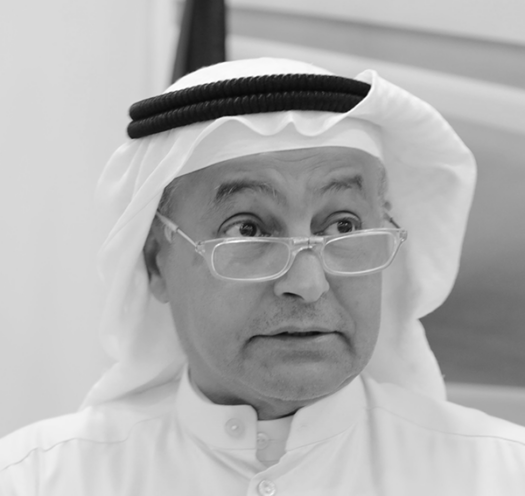


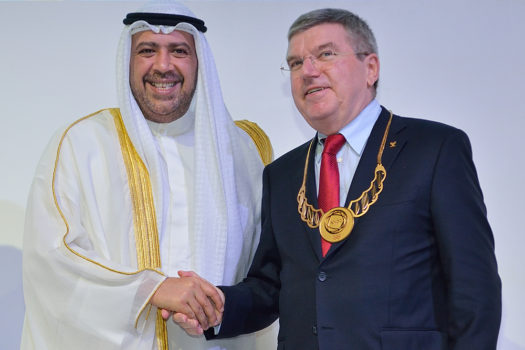
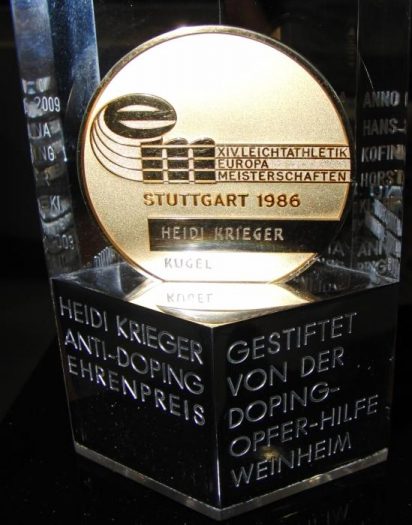
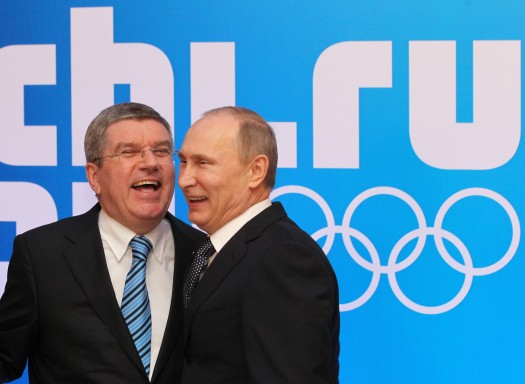
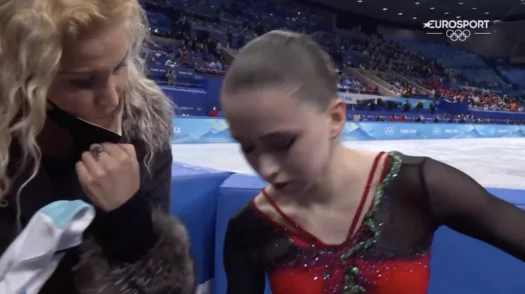
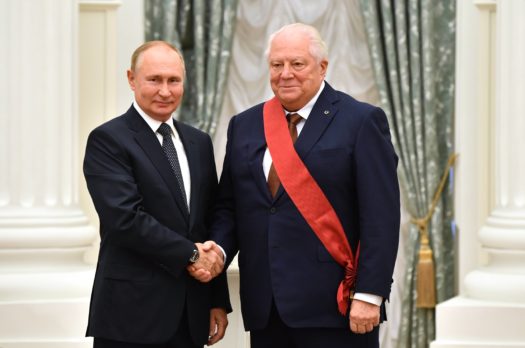
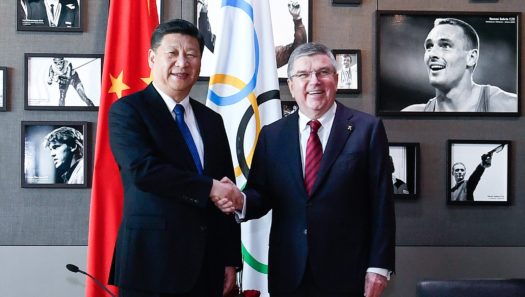
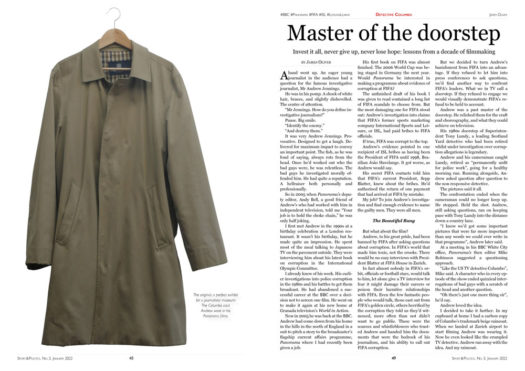
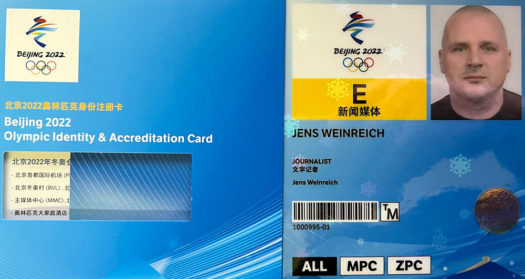
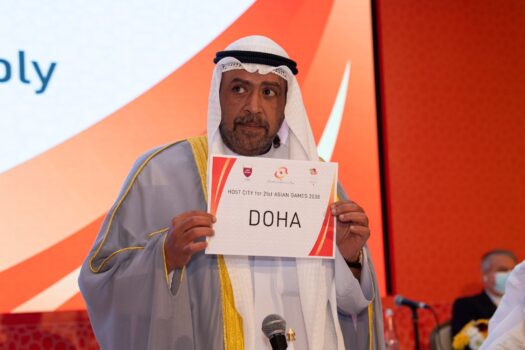
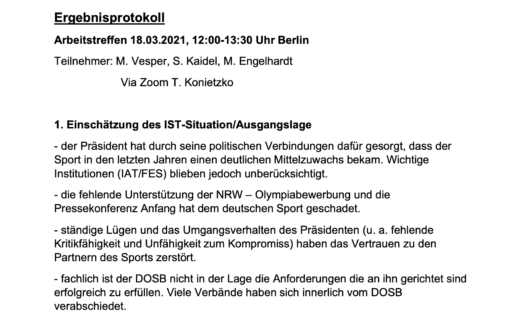
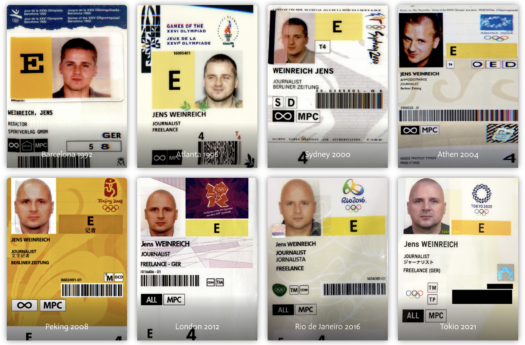

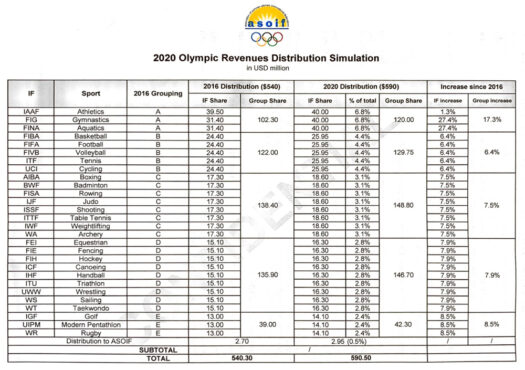
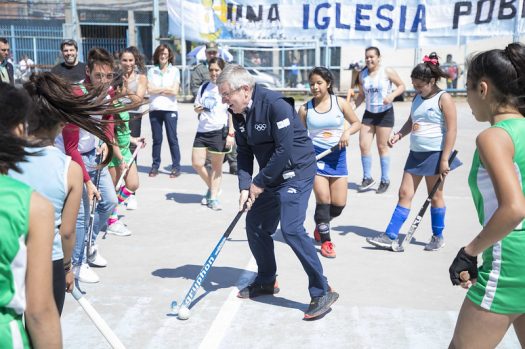
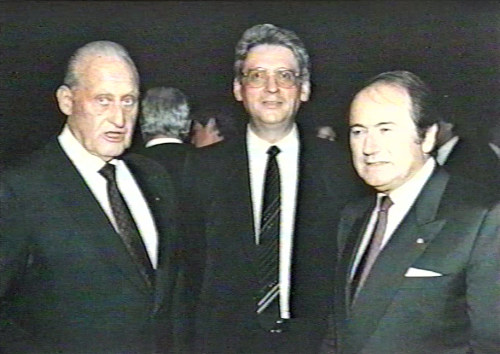
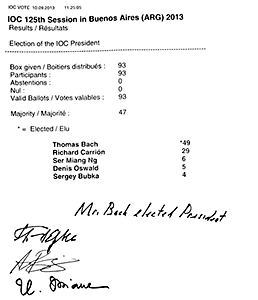
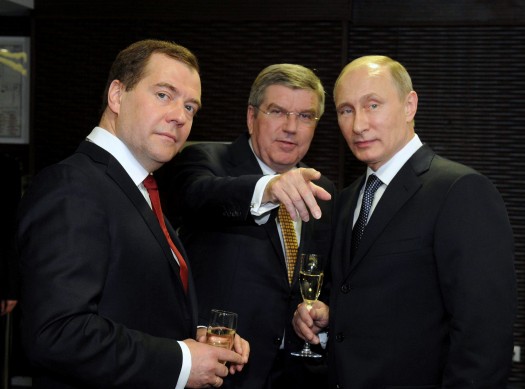
Im Hinblick auf die Vergabe der olympischen Spiele 2016 fragen sich die Verantwortlichen der Bewerberstadt Tokio, ob die Wahl Obamas die Kandidatur von Chicago beeinflussen wird.
http://www.lequipe.fr/Jo/20081105_121102_un-effet-obama_Dev.html
jw in der SZ: Olympischer Testsieg
http://www.sueddeutsche.de/,ra5m1/sport/874/316754/text/
Ich finde Spekulationen über Barack Obama und seinen Einfluss auf die IOC-Entscheidung über den Austragungsort 2016 ziemlich nebelig. Warten wir mal ab, wieviel Geld die US-Fernsehgesellschaften bieten und was sie für Bedingungen nennen werden, um bereitwillig mehr als eine Milliarde Dollar auf den Tisch zu blättern. Die Refinanzierung solch exorbitanter Lizenzen wird für die Sender nicht leichter, sondern schwerer. Weshalb sie auch keine Konzessionen mehr an jene Leute machen werden, die da von Lausanne aus auf ewig ohne Transparenz und ohne irgendeinen sportlichen Wert ihr eigenes Großherzogtum betreiben wollen. Zwei Prognosen von hier aus: Chicago wird für 2016 den Zuschlag bekommen. Und es werden die letzten Spiele der Neuzeit sein. Die Luft ist jetzt schon raus. Das Auto rollt nur noch auf den Felgen.
Jürgen, so nebelig ist das gar nicht. Zumindest folgendes nicht, und dabei habe ich es vorerst belassen:
1) McCain wäre die Fortsetzung Bushs mit anderen Mitteln gewesen. Bei seiner speziellen IOC-Geschichte wäre das für Chicago imho der Tod gewesen.
2) Obama eröffnet Optionen. Ob er bis zum Oktober 2009 geopolitisch Eis brechen kann, wissen wir nicht, wir vermuten es nur. In dem Maße, wie ihm dies gelingen sollte, steigen auch die Chancen, sportpolitisch – und das ist auch geopolitisch – Eis zu brechen.
3) Nimm mal den Vergleich zu NYC’s Bewerbung für 2012: Diese Bewerbung war wegen GWB ab einem gewissen Punkt absolut chancenlos. Das haben nur die Amerikaner nicht begriffen, auch nicht die amerikanischen Journalisten, die über Sportpolitik schreiben. (Ich habe selbst übrigens unmittelbar nach 9/11 mal in Texten gesagt, das IOC sollte die internationale Bewerbung aussetzen und die Spiele wegen 9/11 nach NYC vergeben. Okay, war nur so ein Vorschlag :))
Im Vergleich zu NYC im Jahr 2005 darf sich Chicago exorbitant größere Hoffnungen machen.
4) Obama wird in Kopenhagen dabei sein. Das hatten Daley/Ryan schon vorher eingetütet.
5) Obama selbst hat übrigens am 6. Juni 2008 gesagt, er wolle im Sommer 2016 am Ende seiner zweiten Amtszeit als US-Präsident ins Stadion in Washington Park einmarschieren und die Olympischen Spiele eröffnen: „Let the Games begin“, hat er gesagt.
6) Ich finde es putzig-irritierend, dass sich ausgerechnet die doch sprichwörtlich sportpolitisch zurückhaltenden Japaner zum Obama-Faktor beim IOC äußern. Man macht sich also Sorgen.
7) Welchen Einfluss die dringend anstehenden NBC-Verträge haben können, weiß ich nicht. Da bin ich relativ unsicher.
8) Ein Punkt, den ich in dem SZ-Text nicht erwähnt habe, zuvor aber schon mehrfach verhandelt habe, bleibt natürlich: Das USOC muss einen Teil seiner IOC-Millionen abgeben. Ohne diesen Deal, der den Amis sehr weh tut, hat Chicago Null Chancen, Obama hin oder her.
Ich wollte dazu ohnehin noch einen Blogbeitrag schreiben.
Pingback: Barack Obama: “Let the Games begin!” : jens weinreich
Pingback: Die etwas anderen Demagogen: links, schrill, poetisch : jens weinreich
Na da bin ich ja mal gespannt :)
Pingback: boxsport
Pingback: Boxing World